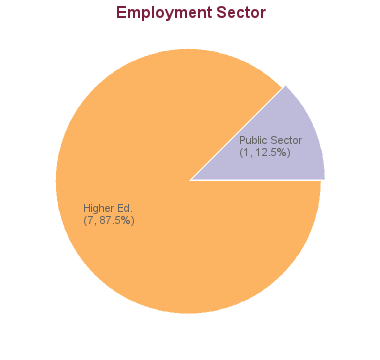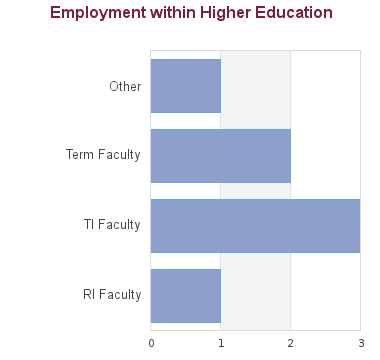Holly Bergeron-Dumaine
Doctor of Philosophy in Music, Emphasis Theory (PhD)
Critical music theory pedagogy

Review details about the recently announced changes to study and work permits that apply to master’s and doctoral degree students. Read more
Theories of music describe ways that listeners, composers, and performers conceive of the elements of their art. Study of theory, then, informs all aspects of musical learning at UBC. Our faculty include internationally known researchers who contribute to theories of rhythm and meter, music cognition, computer applications, music theory pedagogy, and the analysis of a diverse range of recent art music and traditional music from across the world.
Students in our graduate programs are mentored professionally through intensive seminars, teaching assistantships, research assistantships, and conference participation. We welcome research of an interdisciplinary nature, involving musicology, ethnomusicology, mathematics, linguistics, and other musically pertinent areas.
Our faculty includes internationally known researchers who contribute to theories of rhythm and meter, music cognition, computer applications, music theory pedagogy, and the analysis of a diverse range of recent art music and traditional music from across the world.
Students in this program attain advanced proficiency in the theories and analysis of Western music (including tonal and post-tonal music); practice in the analysis of world music; familiarity with recent scholarship on diverse topics in music theory; and experience in independent, critically engaged research and writing projects in music theory and analysis.
The Faculty of Graduate and Postdoctoral Studies establishes the minimum admission requirements common to all applicants, usually a minimum overall average in the B+ range (76% at UBC). The graduate program that you are applying to may have additional requirements. Please review the specific requirements for applicants with credentials from institutions in:
Each program may set higher academic minimum requirements. Please review the program website carefully to understand the program requirements. Meeting the minimum requirements does not guarantee admission as it is a competitive process.
Applicants from a university outside Canada in which English is not the primary language of instruction must provide results of an English language proficiency examination as part of their application. Tests must have been taken within the last 24 months at the time of submission of your application.
Minimum requirements for the two most common English language proficiency tests to apply to this program are listed below:
Overall score requirement: 90
Reading
22
Writing
21
Speaking
21
Listening
22
Overall score requirement: 6.5
Reading
6.0
Writing
6.0
Speaking
6.0
Listening
6.0
Some programs require additional test scores such as the Graduate Record Examination (GRE) or the Graduate Management Test (GMAT). The requirements for this program are:
The GRE is not required.
The entering student should have completed a program of study comparable to our M.A. in Music Theory.
The entering student should have completed a Master's degree or its equivalent, including a thesis. Exceptionally, however, a student who has completed 12 credits in the first year of an M.A. program may be offered admission directly into the Ph.D. (without completing the M.A. thesis) if the student has demonstrated sufficient mastery of graduate-level material and sufficient development as a scholarly writer. Students who wish to transfer from a master’s to a doctoral program must have completed one year of study in the master’s program with a minimum 80% average in 12 credits, of which at least nine credits must be at the 500 level or above and at least nine credits must be at 80% or above. The student must show clear evidence of research ability.
All applicants have to submit transcripts from all past post-secondary study. Document submission requirements depend on whether your institution of study is within Canada or outside of Canada.
Many programs require a statement of interest, sometimes called a "statement of intent", "description of research interests" or something similar.
Students in research-based programs usually require a faculty member to function as their thesis supervisor. Please follow the instructions provided by each program whether applicants should contact faculty members.
Permanent Residents of Canada must provide a clear photocopy of both sides of the Permanent Resident card.
All applicants must complete an online application form and pay the application fee to be considered for admission to UBC.
Students in music theory draw upon the wide expertise of the research faculty, including Renaissance sacred polyphony; Reformation and Counter-Reformation; opera history and reception; the interrelations of music and other performing arts; nineteenth-century topics (program music, form, harmony, art song); 20th- and 21st-century art and popular music; rhythmic analysis; theory construction and analytical method; music cognition; music theory pedagogy; computer-based analysis and corpus studies; aspects of modern and contemporary music and musical life; and music of East Asia (especially Korea and Bali). The faculty in performance and composition includes many figures well-known throughout Canada and beyond for their work in concert, on radio, and on CDs.
From the state-of-the-art Chan Centre for Performing Arts, one of North America's premier musical venues, to the historic Old Auditorium and intimate Roy Barnett Recital Hall, to university-wide resources such as the Emerging Media Labs, graduate students in music have access to world-class facilities.
| Fees | Canadian Citizen / Permanent Resident / Refugee / Diplomat | International |
|---|---|---|
| Application Fee | $118.50 | $168.25 |
| Tuition * | ||
| Installments per year | 3 | 3 |
| Tuition per installment | $1,875.34 | $3,294.66 |
| Tuition per year (plus annual increase, usually 2%-5%) | $5,626.02 | $9,883.98 |
| Int. Tuition Award (ITA) per year (if eligible) | $3,200.00 (-) | |
| Other Fees and Costs | ||
| Student Fees (yearly) | $1,144.10 (approx.) | |
| Costs of living | Estimate your costs of living with our interactive tool in order to start developing a financial plan for your graduate studies. | |
Applicants to UBC have access to a variety of funding options, including merit-based (i.e. based on your academic performance) and need-based (i.e. based on your financial situation) opportunities.
From September 2024 all full-time students in UBC-Vancouver PhD programs will be provided with a funding package of at least $24,000 for each of the first four years of their PhD. The funding package may consist of any combination of internal or external awards, teaching-related work, research assistantships, and graduate academic assistantships. Please note that many graduate programs provide funding packages that are substantially greater than $24,000 per year. Please check with your prospective graduate program for specific details of the funding provided to its PhD students.
All applicants are encouraged to review the awards listing to identify potential opportunities to fund their graduate education. The database lists merit-based scholarships and awards and allows for filtering by various criteria, such as domestic vs. international or degree level.
Many professors are able to provide Research Assistantships (GRA) from their research grants to support full-time graduate students studying under their supervision. The duties constitute part of the student's graduate degree requirements. A Graduate Research Assistantship is considered a form of fellowship for a period of graduate study and is therefore not covered by a collective agreement. Stipends vary widely, and are dependent on the field of study and the type of research grant from which the assistantship is being funded.
Graduate programs may have Teaching Assistantships available for registered full-time graduate students. Full teaching assistantships involve 12 hours work per week in preparation, lecturing, or laboratory instruction although many graduate programs offer partial TA appointments at less than 12 hours per week. Teaching assistantship rates are set by collective bargaining between the University and the Teaching Assistants' Union.
Academic Assistantships are employment opportunities to perform work that is relevant to the university or to an individual faculty member, but not to support the student’s graduate research and thesis. Wages are considered regular earnings and when paid monthly, include vacation pay.
Canadian and US applicants may qualify for governmental loans to finance their studies. Please review eligibility and types of loans.
All students may be able to access private sector or bank loans.
UBC has working agreements with MPower Financing - an organization providing international students with no-cosigner, no-collateral education loans to study in Canada - and Windmill Microlending - an organization providing loans to skilled immigrants.
Many foreign governments provide support to their citizens in pursuing education abroad. International applicants should check the various governmental resources in their home country, such as the Department of Education, for available scholarships.
The possibility to pursue work to supplement income may depend on the demands the program has on students. It should be carefully weighed if work leads to prolonged program durations or whether work placements can be meaningfully embedded into a program.
International students enrolled as full-time students with a valid study permit can work on campus for unlimited hours and work off-campus for no more than 24 hours a week during academic sessions.
A good starting point to explore student jobs is the UBC Work Learn program or a Co-Op placement.
Students with taxable income in Canada may be able to claim federal or provincial tax credits.
Canadian residents with RRSP accounts may be able to use the Lifelong Learning Plan (LLP) which allows students to withdraw amounts from their registered retirement savings plan (RRSPs) to finance full-time training or education for themselves or their partner.
Please review Filing taxes in Canada on the student services website for more information.
Applicants have access to the cost estimator to develop a financial plan that takes into account various income sources and expenses.
8 students graduated between 2007 and 2012. Of these, career information was obtained for 8 alumni (based on research conducted between Feb-May 2016):


Students who complete a PhD in music theory are prepared to become university teachers and research professors. Alumni hold full time faculty and administrative positions across Canada and the United States.
These statistics show data for the Doctor of Philosophy in Music, Emphasis Theory (PhD). Data are separated for each degree program combination. You may view data for other degree options in the respective program profile.
| 2023 | 2022 | 2021 | 2020 | 2019 | |
|---|---|---|---|---|---|
| Applications | 5 | 5 | 9 | 1 | 4 |
| Offers | 3 | 1 | 3 | 0 | 1 |
| New Enrolment | 0 | 1 | 1 | 0 | 0 |
| Total Enrolment | 5 | 4 | 4 | 4 | 4 |
Students in research-based programs usually require a faculty member to function as their thesis supervisor. Please follow the instructions provided by each program whether applicants should contact faculty members.
These videos contain some general advice from faculty across UBC on finding and reaching out to a supervisor. They are not program specific.
Theories of music describe ways that listeners, composers, and performers conceive of the elements of their art. Study of theory, then, informs all aspects of musical learning at UBC. Our faculty include internationally known researchers who contribute to theories and analysis of modernist and contemporary art music, theories of rhythm and meter, performance analysis, and the analysis of both Western art music and world music.
Departments/Programs may update graduate degree program details through the Faculty & Staff portal. To update contact details for application inquiries, please use this form.
